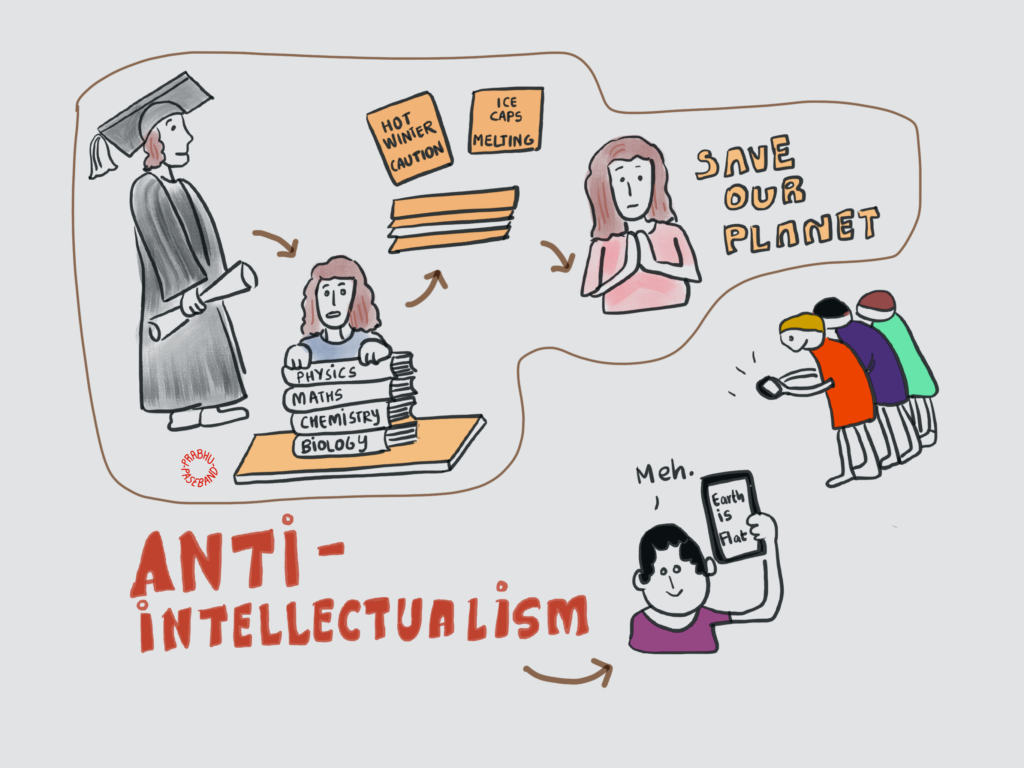It is not uncommon to find someone telling us indeed very seriously that masks do more harm to us than do help us prevent invisible viruses. Or maybe emphasise the fact that Climate Change is a myth cooked by scientists. Yet again we all hear the superiority of one race over the other or the rise of fundamentalist religion. One might assume that the juvenile battles based on supremacy over race and religion would have ended with the World War II where the world witnessed atrocities to people everywhere in the world.

As we are still slowly getting out of the deep trenches of our indelible mistakes, we are yet again faced with the problems of misinformed public who openly criticise fact-based systems. People who cannot accept such fact-based derivations but who believe that their own opinion deserve equal footing with that of scientifically backed findings are branded anti-intellectuals. As the name suggests, they do not necessarily have a lower Intelligence Quotient (I.Q). They might even possess a high I.Q. But as we know, critical thinking is a process of thinking in which intelligence is systematically used to categorise well-reasoned facts. What they lack is just that. Today, where ‘Polio’ is almost eliminated from the face of earth thanks to a very efficient vaccine developed decades ago, people still believe vaccines are not effective and they cause more harm than benefits. More often than not, misinformation is a product of societal forces.
As a global civilisation, it is only very recently that we have accepted a global vision of progressiveness of humankind collectively. Though we have borders and ideals to protect and defend, this fundamental goal remains acceptable to everyone. Capitalism through industrialisation has played a major role in establishing this global agenda. While science and technology helped us polish our machines by introducing more and more lean systems to optimise production, industries gave humanity the kind of things that they crave for. This craving for tawdry trinkets never was satiated which fuelled consumerism thereby making the rich people richer. Though the overall quality of life of developing countries increased to a certain extent, vast majority of people still remain poor.
In this process of production of ‘things’, the consumers and the producers conveniently ignored the effect on climate globally. People enjoyed being entertained and doesn’t seem to mind working overtime to make money so that they can buy that more expensive thing to add to their collection. The industrialists, who benefit out of this pursuit of things by the consumers, influenced the policymakers to ignore the climatic changes in the name of increase in GDP (economic growth of the country). Thus, the people at the helm of power learned that as long as citizens of a country keep themselves entertained with simple things or petty issues, they can get away with their bulging wallets.
Imagine this process continuing over decades which aimed at providing everything required for an average citizen so as not to question the authorities! This process involved changing ideas and sometimes even facts in school textbooks to match more traditional mindset of the average citizens. Laziness to understand complex ideas pushed these people to stick to what is easily understood. Thus, people started choosing convenience over facts. This choice of easy ideas slowly shaped the imagination of people who ended up agreeing with each other thereby forming a community.
Over time, politicians and leaders injected religion into this mix of lazy ignorance. People remained entertained in their daily life without questioning the roots of this belief system. Politicians found their vote banks, industrialists found their target markets- all this at the cost of human ignorance and arrogance which makes us believe that we cannot be manipulated. Cognitive biases are excellent examples illustrating our ease of being manipulated.
It is high time to accept that we are all products of societal influences and start questioning our beliefs which we take to be true. It is time to learn critical thinking before we all lose ourselves in the sea of consumerist confusion.